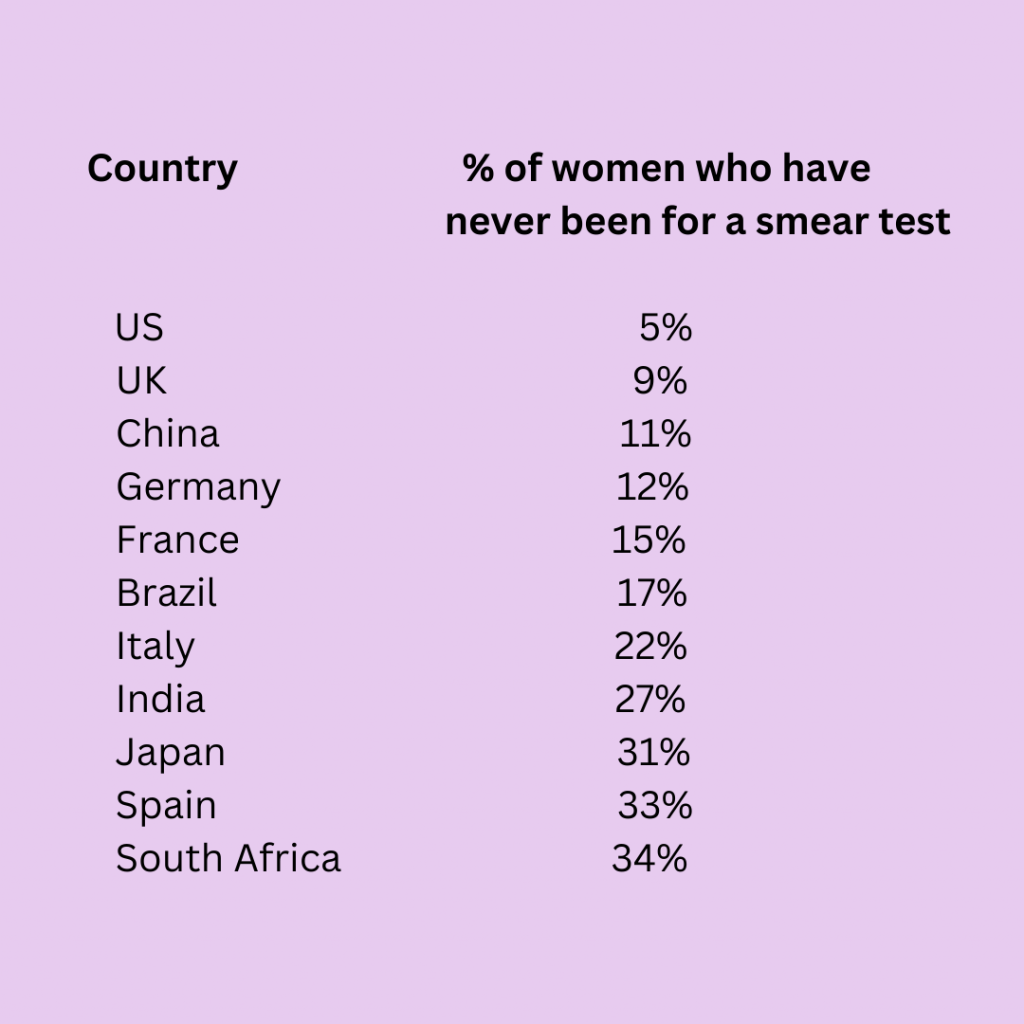There are still huge gaps in women’s healthcare. In 2023, this is how to get rid of them

Less than a quarter of women feel that their health concerns are addressed when they visit a healthcare professional. This is one of the grim, yet unsurprising findings of a recent survey, which asked 11,000 people from 11 different countries about their experiences of their local healthcare provider.
Only 21% of women said they feel all their health concerns are dealt with when they see a doctor – a figure that drops as low as 7% in Japan. Even more concerning is that 17% of women respondents in Japan said they have never been to a health professional to discuss women’s health issues.
The survey also found that men are more likely to feel confident about their healthcare provision compared to women and non-binary respondents. In the UK, 13% of women and non-binary respondents rated their confidence as 3 out of 10 or below, whereas only 5% of men said the same. Conversely, 14% of men scored confidence at a 9 out of 10 or higher, compared to 7% of women.
While the survey focuses on higher income nations, it serves as a good reminder that healthcare provision for women is lacking in many areas of the world, leading to poor confidence in health systems.

The gaps in women’s healthcare
The research found that the US ranked as the best country for women believing they are listened to by doctors, however the proportion is still in the minority with only 33%.
Perhaps the most worrying trend to arise from the survey is occurring in the UK, where 1 in 4 UK women aged between 25 and 64 haven’t been for a smear test in the last 5 years. It is recommended that women have a cervical smear every 3 to 5 years, however only 23% of UK women have been for a smear test within the past year – the lowest percentage out of all the countries surveyed.

However the UK ranked low for the number of people who have never had a smear test with only 9%. By comparison 34% of South African respondents and 33% of Spanish respondents say they have never had a cervical screening.
Outside of the report’s findings, Africa is among the worst regions in the world for maternal healthcare, accounting for more than half of all maternal deaths worldwide. In many cases this is happening simply because of a lack of skilled healthcare professionals.
The survey identified that 66% of female respondents frequently research their symptoms before visiting a healthcare professional, in comparison to 55% of men.
The Covid-19 pandemic provided a good example of this. It has by now been widely reported that many women experienced disruptions to their menstrual cycles after being administered a vaccine, only to be told that the irregular periods and increased pain were due to stress. Even in the vaccine’s earliest days, there should have been an acknowledgement of these potential vaccine side effects rather than an immediate, outright dismissal.
There is a lengthy history of the medical profession ignoring women’s healthcare concerns which continues to this day, but in 2023 there is enough scientific evidence to do better.
Remove the shame around menstruation
Unfortunately in many parts of the world there is still a great deal of stigma attached to menstruation. This leads to a wide range of problems, including girls skipping school while on their period, women not feeling able to tell an employer about painful dysmenorrhea, and discrimination because of the idea that menstruating is somehow “dirty”.
The World Bank estimates that at least 500 million women lack access to facilities to manage their periods. The problem is not limited to the Global South either, as a 2019 study in Missouri, US, found that 64% of women could not afford menstrual products.
A small number of countries – among them Japan, Zambia, South Korea and Indonesia – offer paid menstrual leave, enabling women to take time off from work if they experience painful periods.
In December 2022, Spain approved legislation which will make it the first European country to have this provision. Canada, Australia and Germany have also either lowered or eliminated taxes on sanitary products to eradicate period poverty, while Scotland is the first country to provide free sanitary products under its Period Products Act.
Expand reproductive healthcare access
The US Supreme Court’s decision to reverse Roe v Wade is not only a retrograde step for women’s rights, it’s also a decision that has serious repercussions for women’s health. The strict abortion legislations now in place in a number of states mean that access to care in case of miscarriage or other pregnancy-related problems is under threat.
The new restrictions are also exacerbating healthcare inequalities, with Black women nearly three times more likely to die from pregnancy-related complications than white women, and Indigenous women often having limited access to healthcare. This lack of affordable contraception, family planning and maternal healthcare are contributing to the US’ maternal mortality rate, which is three times higher than in other countries in the Global North.
Latin American countries such as Mexico, Colombia and Argentina have been expanding access to reproductive rights, largely thanks to the work of activists, lawyers and healthcare professionals who have long highlighted that criminalising abortions leads to women dying due to unsafe procedures.
Improve education to encourage screening
A total of 14% of all survey respondents said they did not know what the human papillomavirus (HPV) is, with 33% saying they do not have regular tests. HPV is very common and often symptomless, but certain strains can cause cervical cancer.
This is the fourth most common cancer among women globally. While 90% of the new cases and deaths reported in 2020 were in low- and middle-income countries, the numbers of women who do not attend regular screenings show that better education around HPV and its implication in cervical cancer is vital around the world, along with better access to screening.
Improving education must also be applied to healthcare professionals to help them better understand women’s health concerns. Breast cancer, still the most common form of cancer worldwide, goes undetected for too long in countries where there is a stigma around women’s bodies. Along with pushing for greater awareness of women’s needs (for example the discomfort and pain associated with cervical examinations), more women doctors and surgeons are needed to encourage more women and girls to feel comfortable raising their health concerns.
Leila Hawkins

READ MORE:
Meet the UAE’s first female surgeon, breaking down the breast cancer taboo
“This is how change happens” – Activists use social media for reproductive justice in Morocco

2 thoughts on “There are still huge gaps in women’s healthcare. In 2023, this is how to get rid of them”